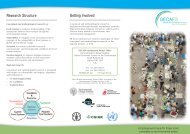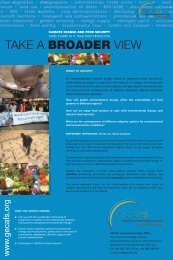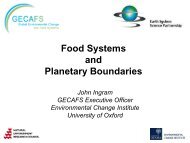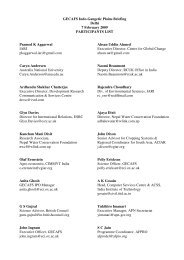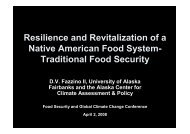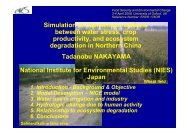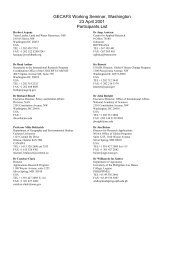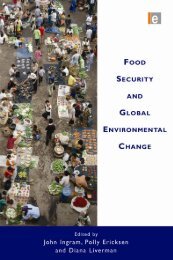Box 2 Engaging with stakeholders in the Competing Claims programme.Too often, researchers blithely refer <strong>to</strong> involving ‘all stakeholders’. And perhaps even worse, attemptsare made <strong>to</strong> bring all stakeholders <strong>to</strong>gether in ‘multi-stakeholder platforms’. This may be a validapproach when the issue at stake is relatively simple and has few stakeholders, but when the stakesare high and cultural differences run deep, meetings can precipitate or exacerbate conflict rather thanresulting in useful dialogue. In work in southern Africa on ‘Competing Claims on Natural Resources’,focus is on food security as one important aspect of rural livelihoods that cannot be seen in isolationfrom other livelihood pursuits (see www.competingclaims.nl). A key concept in the approach is thatlocal problems need <strong>to</strong> be addressed at multiple hierarchical levels <strong>to</strong> enlarge the ‘solution space’within which new opportunities can be sought.Identifying stakeholders at the higher levels in a hierarchy is simpler by definition – there are fewerplayers <strong>to</strong> choose from. When engaging with rural people, initial engagement must inevitably startthrough local officials and village leaders, though it should not be naïvely assumed that they representthe position of the majority. In particular the poorest and most disadvantaged are the last <strong>to</strong> contributein meetings, if they attend at all. Experience shows that it is not possible <strong>to</strong> develop a rulebook, or astandard set of methods that will work in all settings. What is critical is having an ear close <strong>to</strong> theground, and taking time <strong>to</strong> identify marginal and excluded stakeholders and understand the positionsof the different stakeholders before bringing them <strong>to</strong>gether <strong>to</strong> discuss issues at stake.A further issue is the legitimacy of the ‘outsider’ researcher in local debates and problems, and thismay be particularly apt in cross-cultural settings. Collaboration with local researchers, NGOs or otherdevelopment agencies is necessary, but often leads the researcher <strong>to</strong> become – unwittingly –associated with such local stakeholders, compromising his/her legitimacy for another set ofstakeholders. The political neutrality of the researcher is a fallacy, because already research questionstend <strong>to</strong> be posed by some parties rather than others, and inherently build on specific societal problemdefinitions, values and aspirations. A transparent yet rigorous approach which makes the stakesexplicit is a more modest, yet realistic, approach <strong>to</strong>wards becoming legitimate.The only general rule <strong>to</strong> be drawn is that there are no quick and clean methods of identifyingstakeholders. It takes time and commitment <strong>to</strong> gain useful insights, build legitimacy amongstakeholders, and <strong>to</strong> contribute <strong>to</strong> development. These issues are further discussed by Giller et al.(2008).Finally, it is also worth noting that some key stakeholders (e.g. the business community) maysometimes be missing from the debate, and it is important <strong>to</strong> try <strong>to</strong> identify why this is thecase. Is it that they cannot afford the funds or time <strong>to</strong> become engaged; or they are notallowed <strong>to</strong> be involved (perhaps for political reasons); or they are simply not interested? It isalso important <strong>to</strong> try <strong>to</strong> determine the impact of their absence, and what – if anything – can bedone <strong>to</strong> compensate. Certainly, given that stakeholder participation can sometimes be seen asan au<strong>to</strong>matic requirement, taking on something of a ‘tick-box’ culture, some potentiallyimportant stakeholders may need <strong>to</strong> be persuaded <strong>to</strong> join the debate, especially if they arejaded from earlier, ineffective or disingenuous experiences. To overcome this challenge it isimportant <strong>to</strong> stress the benefits that engagement will bring <strong>to</strong> the stakeholder (rather than thebenefits their engagement will bring <strong>to</strong> the researcher/project): how will engagement help68
them in their policy or business or funding planning? Ideally, reluctance should transformin<strong>to</strong> a commitment <strong>to</strong> engage.Who sets the GEC–food security research agenda, and how?Basic research is typically disciplinary-focused, often undertaken by relatively small groupsof researchers. There may be little need <strong>to</strong> engage with beneficiary groups, even if the ‘end ofpipe’ research outputs are anticipated <strong>to</strong> be of some practical use. The more involvedapproach needed <strong>to</strong> address the broader issues of food security will lead <strong>to</strong> research beingconducted within a more complex context. This might well be characterized by multiplebiophysical and social scientific issues, a high degree of uncertainty, value loading and aplurality of legitimate perspectives of the varied stakeholders. Researchers trained in a givendiscipline which, on the face of it, addresses directly the issues they are investigating can wellfind themselves confronted by a range of issues in which they have no experience or training.Indeed, stakeholder engagement in the way being discussed here, and especially at theregional level, is not the norm for GEC science endeavours.In the ‘classic’ GEC research project typical of the international GEC research programmes, ascience plan is conceived by the scientists and published. This lays out the research need (asperceived by the research community) in terms of science output, and the relevance <strong>to</strong> thepolicy process and resource management is often of less importance. Where relevance <strong>to</strong>policy is indicated, it usually relates <strong>to</strong> the global level such as the United NationsFramework Convention on Climate Change or other international conventions.By contrast, the agriculture and food security research communities have been working withpartners on the ground, farmers, policy-makers and other non-research stakeholders for manyyears, and lessons learnt have much <strong>to</strong> offer researchers addressing the interactions betweenGEC and food security.Due <strong>to</strong> the complex nature of both GEC and food security, GEC–food security research canbe of greater value <strong>to</strong> stakeholders if set within the regional context and tailored <strong>to</strong> the needsof regional policy-makers, NGOs, businesses and resource managers. Setting a research andregion-specific agenda that is relevant <strong>to</strong> regional (as opposed <strong>to</strong> global and/or generic) issuesneeds a highly consultative and inclusive approach. Further, when conducted in regions of thedeveloping world, the links <strong>to</strong> the development agenda, and particularly <strong>to</strong> the MillenniumDevelopment Goals, must be explicit. This necessarily means a stronger link <strong>to</strong> thedevelopment donor community, who are not traditional funders of GEC research. Again,lessons learnt by the agriculture and food security research community have much <strong>to</strong> offer.Box 3 shows the main steps in agenda-setting within GECAFS regional studies.69
- Page 1 and 2:
From Food Production to Food Securi
- Page 3 and 4:
From Food Production to Food Securi
- Page 5 and 6:
Table of ContentsAbstract .........
- Page 7 and 8:
Paper 6: Undertaking Research at th
- Page 9:
AbstractFood security is a conditio
- Page 12 and 13:
2010 about 925 million people had t
- Page 14 and 15:
water) are used, and reduce negativ
- Page 16 and 17:
While the flow of the argument abou
- Page 18 and 19:
determine interactions along and be
- Page 20 and 21:
Paper 3: A Food Systems Approach to
- Page 23:
From Food Production to Food Securi
- Page 26 and 27:
concerns and are now issues that mu
- Page 28 and 29: the relationships between GEC and f
- Page 30 and 31: Theme 2 aims to understand how comm
- Page 32 and 33: GEC and the Food System of the Indo
- Page 34 and 35: Paper 2: The role of agronomic rese
- Page 36 and 37: These advances have resulted from a
- Page 38 and 39: Crop selection to determine mechani
- Page 40 and 41: Agronomic science is central to imp
- Page 42 and 43: Agronomic research in relation to f
- Page 44 and 45: The discussion above identifies a n
- Page 46 and 47: interventions and political inertia
- Page 48 and 49: While research on producing food ha
- Page 50 and 51: Box 1 Food system Activities and fo
- Page 52 and 53: In addition to broadening the debat
- Page 54 and 55: options. Examples already seen rang
- Page 56 and 57: Figure 3 Outcomes for 10 variables
- Page 58 and 59: Figure 4 Nine ‘planetary boundari
- Page 60 and 61: Figure 5 Environmental change, food
- Page 62 and 63: Table 1: Indicative analysis of the
- Page 65: From Food Production to Food Securi
- Page 68 and 69: Trade Agreement (NAFTA) and the Eur
- Page 70 and 71: Parry et al., 2005). Conducting foo
- Page 72 and 73: is provided in the ESF/COST Forward
- Page 74 and 75: Paper 5: Engaging Stakeholders at t
- Page 76 and 77: into actions (strategies, policies,
- Page 80 and 81: Box 3 Setting the research agenda f
- Page 82 and 83: Third, and of considerable practica
- Page 84 and 85: Figure 2: Organizing and understand
- Page 86 and 87: organizations made up of numerous n
- Page 88 and 89: Elements of good practice in stakeh
- Page 90 and 91: Finally, it is worth noting that fo
- Page 92 and 93: development (Lee, 1999; Gunderson a
- Page 94 and 95: Box 7 The GECAFS stakeholder survey
- Page 96 and 97: ‘break down’ what might be a hi
- Page 98 and 99: Paper 6: Undertaking Research at th
- Page 100 and 101: agriculture in many parts of the wo
- Page 102 and 103: gaps. The presence of a strong tech
- Page 104 and 105: an average of two years to coalesce
- Page 106 and 107: Institute for Meteorology and Hydro
- Page 108 and 109: Identifying case study sitesResearc
- Page 110 and 111: can both benefit from and contribut
- Page 112 and 113: Box 5 Mapping stakeholder interests
- Page 114 and 115: Holding planning meetings in locati
- Page 116 and 117: This reorientation of the debate fr
- Page 118 and 119: Importance of this type of research
- Page 120 and 121: Integrating the food system concept
- Page 122 and 123: awareness of the GEC issues within
- Page 124 and 125: pollutants were then introduced as
- Page 126 and 127: communities operating in food syste
- Page 128 and 129:
Improving input-use efficiency acro
- Page 130 and 131:
governance focuses on the range of
- Page 132 and 133:
Developing research agendas in supp
- Page 134 and 135:
The renewed approach to interdiscip
- Page 136 and 137:
BIELAK, A., HOLMES, J., SAVGÅRD, J
- Page 138 and 139:
EAKIN, H. 2010. What is Vulnerable?
- Page 140 and 141:
GODFRAY, H. C. J., BEDDINGTON, J. R
- Page 142 and 143:
INGRAM, J. S. I. & FERNANDES, E. C.
- Page 144 and 145:
LYUTSE, S. 2010. The One Billion To
- Page 146 and 147:
RAYNER, S. & MALONE, E. L. 1998. Hu
- Page 148 and 149:
UNDP 2006. The 2006 Human Developme
- Page 150 and 151:
activities “from plough to plate
- Page 152 and 153:
contribution to the science agenda:
- Page 154 and 155:
urgently needed, and - given the gr
- Page 156 and 157:
GECAFS plannenmakerij stelde vast d
- Page 158 and 159:
ieder hun eigen groep van betrokken
- Page 160 and 161:
het gebied van beheer hebben betrek
- Page 162:
Curriculum VitaeFollowing a BSc in



